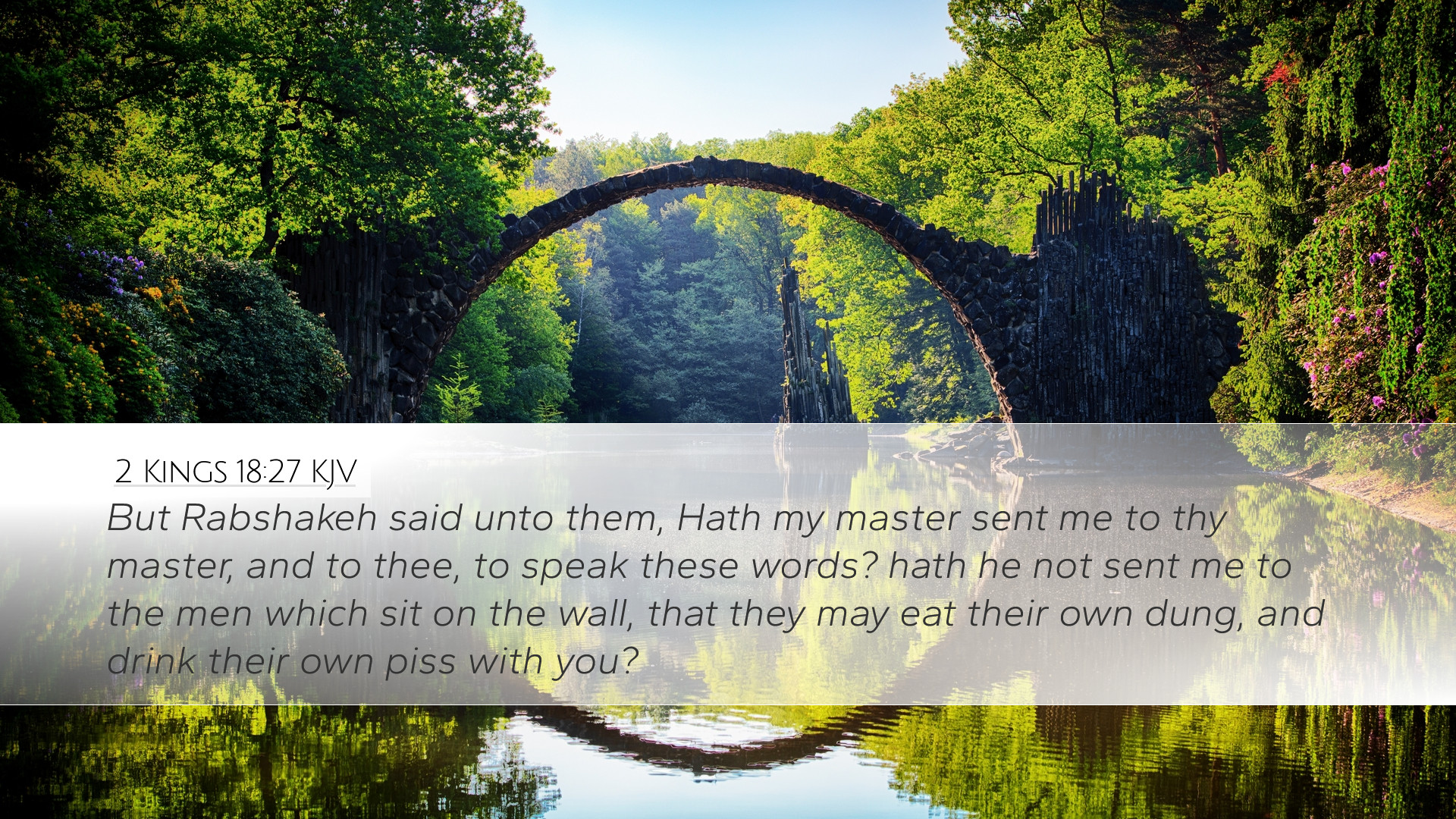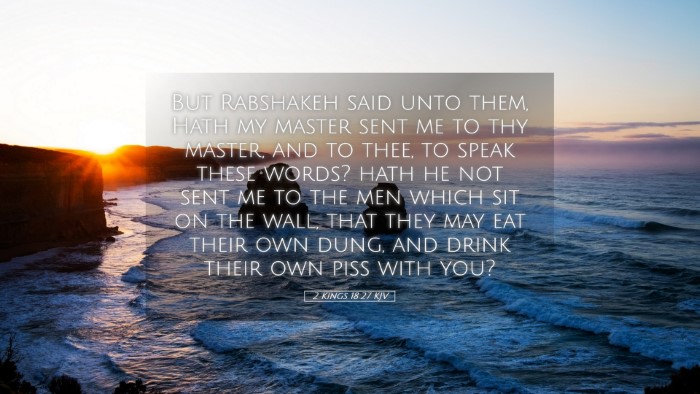Commentary on 2 Kings 18:27
2 Kings 18:27 states: "But Rabshakeh said unto them, Hath my master sent me to thy master and to thee to speak these words? hath he not sent me to the men which sit on the wall, that they may eat their own dung, and drink their own water with you?" This verse occurs during the tense encounter between the Assyrian envoy Rabshakeh and the representatives of King Hezekiah of Judah. The context surrounding this verse speaks volumes about the political, spiritual, and psychological warfare of the period.
Contextual Analysis
This passage reflects a critical moment in Judah’s history when the Assyrian Empire was at its zenith. Hezekiah was attempting to affirm his kingdom against Assyrian aggression. The discourse shows the devastating psychological warfare employed by Assyria as Rabshakeh attempts to demoralize the people of Jerusalem.
Understanding Rabshakeh's Role
Rabshakeh serves as the chief envoy of King Sennacherib of Assyria. His statements emphasize the futility of relying on alliances and highlight the certainty of an impending siege. Rabshakeh claims that his message is addressed not just to the officials of Judah but directly to the common people facing hardship. This creates a sense of urgency and hopelessness among those who hear him.
Theological Insights
Examining this verse from a theological standpoint reveals several critical insights.
- The Sovereignty of God: The situation is steeped in the overarching sovereignty of God. Despite the bluster of Rabshakeh, God remained ultimately in control. Hezekiah's reliance on divine aid rather than human might reflects a central theme in the biblical narrative.
- The Efficacy of Prayer: Hezekiah's response to adversity exemplifies the power of prayer. He intercedes on behalf of his people, demonstrating faith in God amidst the threats.
- The Nature of Idolatry: Rabshakeh’s words strikingly critique the idolatry prevalent in Judah. His taunts highlight the ineffectiveness of idols compared to the living God, reminding the audience to whom they ought to turn in times of trouble.
Public Domain Commentary Insights
- Matthew Henry: In his exposition, Henry suggests that Rabshakeh's aim was to instill fear through rhetorical devices. The reference to "eating their own dung" and "drinking their own water" symbolizes the dire straits the people would face due to siege. Henry emphasizes that the language used by Rabshakeh is meant to provoke despair.
- Albert Barnes: Barnes explicates the high stakes surrounding this dialogue. His commentary includes the view that Rabshakeh is mocking the concept of covenant between God and Israel, reinforcing the desperation of their situation. Barnes highlights the contrast between human despair and divine deliverance.
- Adam Clarke: Clarke places significance on the implication of trust. He suggests that the Assyrians are leveraging psychological methods to sway the hearts of the people of Jerusalem. Clarke points out that the desperation communicated mirrors the sinful state of the people at that time, where self-reliance led to an absence of faith in God.
Lessons for Today’s Believers
This verse and its surrounding context offer significant lessons for contemporary believers:
- Facing Threats with Faith: Like Hezekiah, modern believers are called to respond to threats with prayer and confidence in God rather than succumbing to fear.
- Evaluating Alliances: The futility of relying on human alliances over divine assistance is a timeless lesson that calls for discernment in all relationships and endeavors.
- Recognizing Divine Sovereignty: Assyrian threats against Judah serve as a reminder of God’s sovereignty over nations and events. Believers are encouraged to trust that God is in control, no matter how formidable the challenges may appear.
Conclusion
2 Kings 18:27 underscores the significance of faith in God amidst threats. In the character of Rabshakeh, we see the art of psychological warfare, yet in Hezekiah's response, we discern the true essence of reliance on divine strength. The insights from public domain commentaries enrich our understanding of the text, serving to encourage pastors, theologians, and students of the Word in their spiritual journeys.


